 Growing up in a diverse, multicultural society with an increased awareness of important issues, such as climate change, corporate responsibility, and social inclusion, young people today have developed a robust system of values and increasingly desire to work actively towards social change.
Growing up in a diverse, multicultural society with an increased awareness of important issues, such as climate change, corporate responsibility, and social inclusion, young people today have developed a robust system of values and increasingly desire to work actively towards social change.
While Millennials are sometimes characterized as selfish and entitled, today’s prospective students could be said to value social responsibility more than any generation before them. The Deloitte Global 2023 Gen Z and Millennial Survey revealed that climate change is a significant stressor for Gen Zs and millennials. Six in 10 (60% of Gen Zs/57% of millennials) say they have felt anxious about the environment in the past month. The same percentage cites extreme weather events and wildfires as a stress driver. The majority are taking action, with 69% of Gen Zs and 73% of millennials actively trying to minimize their environmental impact.
With that in mind, it’s more important than ever that your recruitment campaigns make an effort to highlight your institution’s sense of social responsibility. While the primary goal of your school’s social initiatives shouldn’t be to market to recruits, aligning your recruitment initiatives with your social responsibility mission is a beneficial situation for everyone.
You can raise awareness of the causes your current students, faculty, and alumni care about while cultivating an identity for your school that resonates with the socially conscious youth of today and attracting prospective students who share the same principles and commitment to improving society as your institution.
Read on to learn more about generating more leads while improving your campus and community.
1. Prospective Students Want to Know that Your School Embraces Diversity
A university should be a welcoming, inclusive environment for people of all cultures, backgrounds, and beliefs. Sadly, for many of your prospective students, this won’t be the experience they have enjoyed throughout their education. Some will have experienced discrimination and bullying due to their race, religion, sexuality, or other factors and want assurances that their university education will offer a more inclusive environment. Even for those who haven’t experienced discrimination firsthand, diversity and inclusion are becoming more important factors, and many of today’s prospective students expect to see universities take an active stance against tolerance and discrimination.
Your online student recruitment strategy should emphasize your school’s commitment to promoting tolerance and acceptance across your campus. This can be accomplished in several ways, such as highlighting events on your campus that cater to minority groups on your social media accounts or promoting your school’s anti-discrimination policies and initiatives prominently on your website.
Example: The University of Glasgow devotes much effort to promoting its FullStop campaign, an equality and diversity initiative highlighting casual discrimination. The campaign is given its subsection on the school’s website, which includes articles and video posts and is promoted through social media with its hashtag.
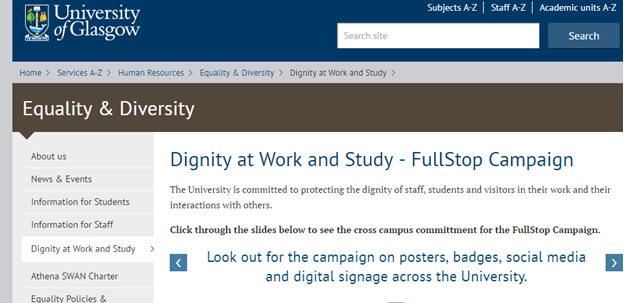

The reaction to the campaign was universally positive, and this message the university shared from one of its students perfectly illustrates the positive impact this sort of campaign can have on the perception of your school among potential recruits.

Your school may also partner with wider diversity initiatives, such as those run by government agencies or special interest groups, which can be incorporated into your website and social media presence, often providing great creative content that is beneficial for potential recruits.
Example: Georgetown University is among the many institutions that contributed a video to the It Gets Better Project, which provides support to LGBT youth. The clip comprises testimonials of LGBT students about their experience and is a great way of connecting with that community and making them feel welcome.

2. Environmental Sustainability Can Be an Important Part of Your Student Recruitment Strategy
Another issue that is important to potential recruits is sustainability. With the effects of climate change now more visible than ever, the environment is very much at the top of the mind among today’s prospective university students. A 2015 Nielsen survey on sustainability found that as much as 45% of respondents are now likely to pay more for products and services from a company with a reputation for being environmentally friendly.
Many universities now devote sections on their website detailing their commitment to sustainable projects. You can also use social media and blogs to highlight new green initiatives around your school, helping to foster a culture of ecological responsibility on your campus and promoting environmental awareness as part of your overall brand identity.
Example: The University of Greenwich has won numerous awards for its sustainability efforts, including the 2013 Times Higher Education Award for Outstanding Contribution to Sustainable Development. The university showcases its commitment to reducing its carbon footprint in several ways, including its website’s devoted sustainability blog and @sust_greenwich Twitter account.
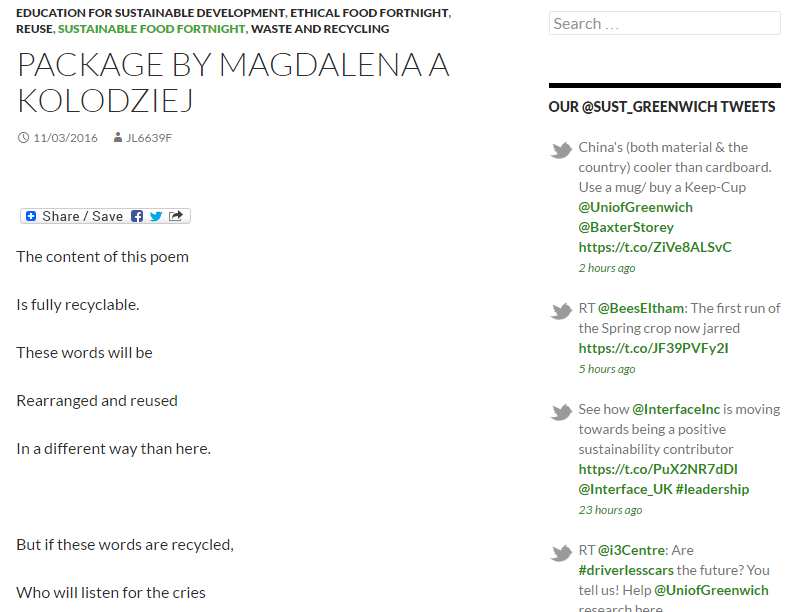
Such is the growing importance of sustainable development to many students. Several schools not only outline their commitment to improving the environment around them but have come to promote their efforts in the area as a differentiator when trying to stand out to recruits, with some success.
Example: The University of Northern British Columbia puts sustainability at the forefront of its message, even adopting the trademark ‘Canada’s Green University.’ The green section of its website is suitably extensive, with information about food and energy initiatives, articles about sustainable development research at the school, and information about local environmental preservation efforts.

3. Today’s Students are Looking for an Education That Will Allow Them to Make a Difference
Deloitte’s survey revealed that 87% of Millennials believe that “the success of a business should be measured in terms of more than just its financial performance.” In comparison, 56% said they have ruled out ever working for a particular organization because of its values or standard of conduct. These figures suggest that modern students seek careers for more than just financial gain, with finding a profession that will allow them to impact society becoming more of a positive priority.
For recruiters, this means presenting your courses as a gateway to careers with a socially responsible focus could help you generate more student enquiries. Your content strategy could be the key to achieving this, and you should consider highlighting research or academic specialties that positively contribute to society in blog posts and articles on your website.
Example: As the home of the Ontario Veterinary College and the Mona Campbell Centre for Animal Cancer, the University of Guelph is naturally a popular study destination for animal lovers. As a result, articles promoting animal welfare are featured heavily in its web content. The below post about a university-led project to improve conditions among backyard poultry is a good example of a school focusing on a socially responsible niche to connect with students.
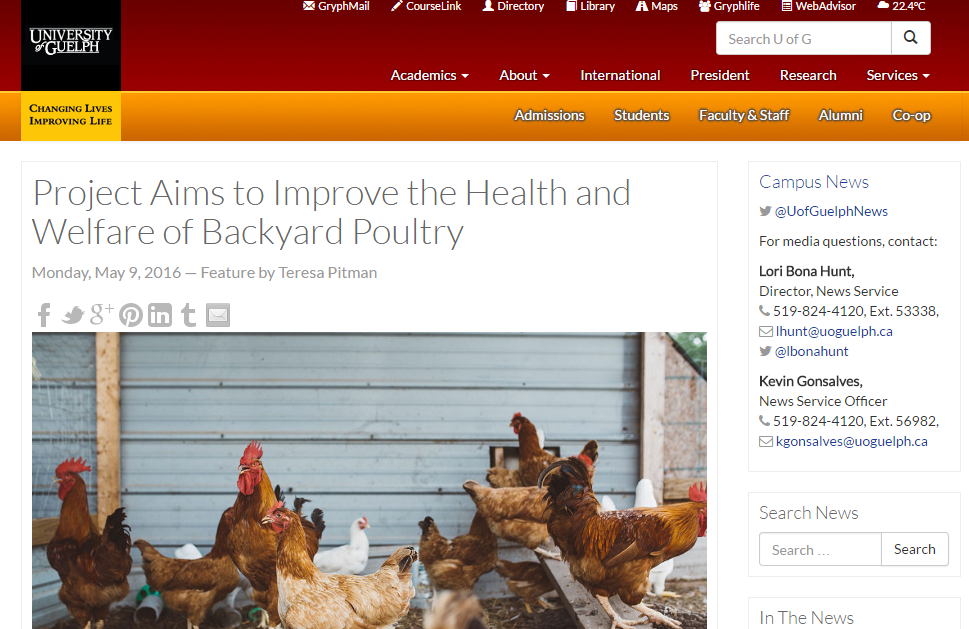
Students may also be attracted to universities with a strong reputation in areas of study that facilitate political and civil advocacy. Promoting conferences, guest speakers, and other events can help identify your school as thought leaders on critical societal issues.
Example: Ryerson University’s Women in Leadership forum has been running for over five years, with as many as four events each year, bringing together female faculty, students, and guest speakers for discussion panels and lectures. The event helps to distinguish the university as a leading proponent of women’s issues.
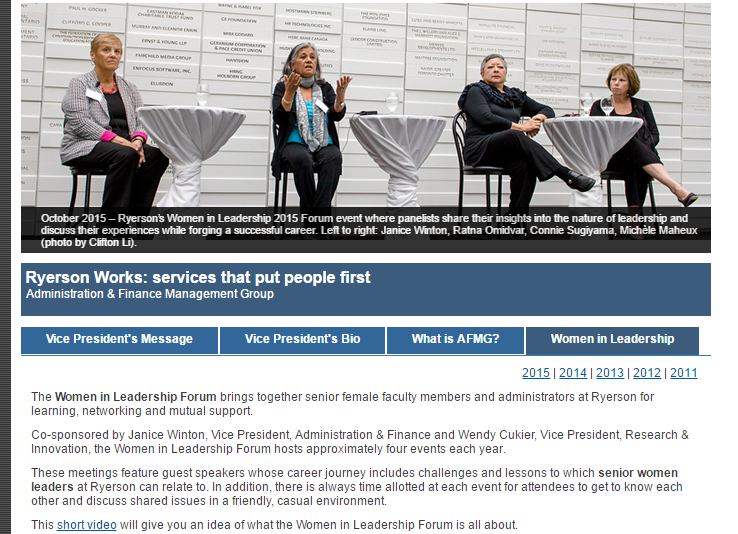
4. Promoting Charitable Activities Can Help You Generate More Student Enquiries
Generally speaking, universities have an excellent track record of raising money and awareness around charitable causes, and college students also tend to be among the most active groups when it comes to volunteering. Many prospective students researching universities will have ambitions to give back by attending fundraising events, joining charitable student societies, or even participating in summer volunteer programs abroad, and your recruitment content should make it clear that they will have opportunities to do that at your school.
Example: Trinity College Dublin’s student services website includes a volunteer forum that provides students with a helpful resource detailing volunteer opportunities on campus.

Another useful way of engaging prospective students is to promote more significant charity initiatives your students and faculty might be involved with on your website and social media. This allows recruits to identify your school with a cause they recognize, making them more likely to connect with your message. Encouraging prospective students to share their experiences of engaging in charitable work on your campus is also an excellent way to promote your efforts and raise awareness.
Example: Loyola University Chicago is one of the many schools participating in Giving Tuesday. This great video features student sharing their experiences of engaging in school-sponsored volunteer events:

Example: The University of Manchester’s social responsibility programs have gained widespread admiration from educational and non-profit communities. The university’s initiatives centre heavily on local events and programs, including events that promote diversity, volunteer work in underprivileged areas, and fun community events. Its website devotes an extensive subdomain to social responsibility, with insightful articles, information on its goals and achievements, and an events calendar.
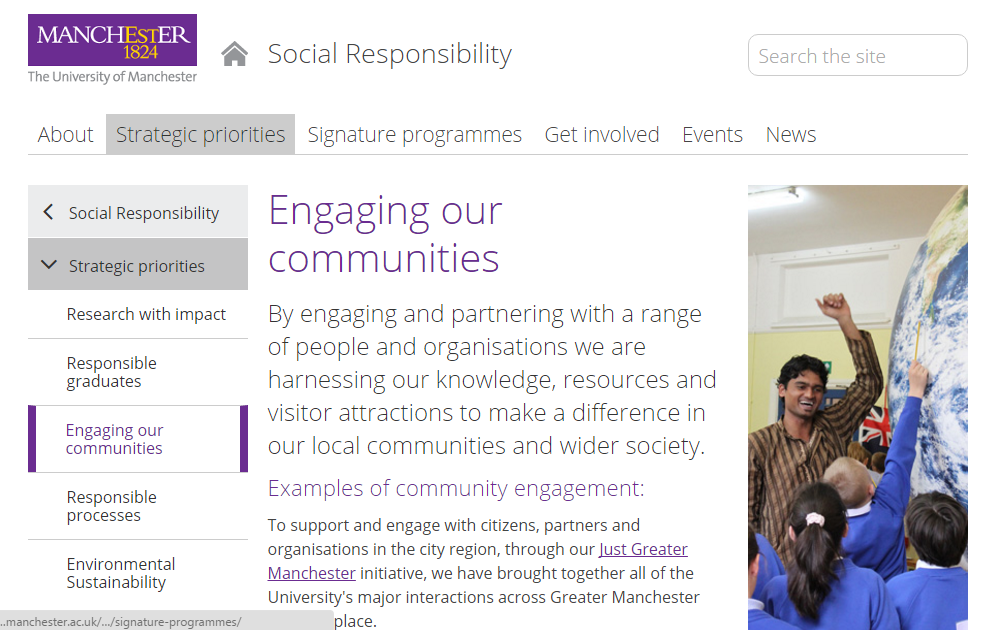
Ensuring Social Responsibility Plays a Role in Your Online Student Recruitment Strategy
Evaluating how much weight social responsibility should have in your school’s online recruitment strategy can be difficult. Establishing detailed student personas and carefully assessing their motivations will help you to incorporate this kind of messaging with more practical content that addresses concerns such as course content, student services, and campus facilities. You may even consider surveying current students to understand what social issues are most important to them.
Once you find the right balance, though, you should see results fast. Content that promotes socially responsible initiatives tends to attract high levels of user engagement, so once you integrate it into your higher education content marketing strategy, it should be possible to see immediate, measurable improvements by tracking your site and social media pages on Google Analytics.
You’ll also see more comprehensive benefits, with content promoting things like fundraising events and community programs attracting more inbound links to enhance your off-site SEO, allowing you to raise even more awareness both of your school and the causes it supports, and building a brand that prospective students know they can trust.















